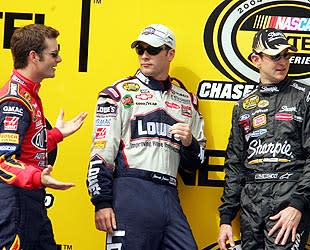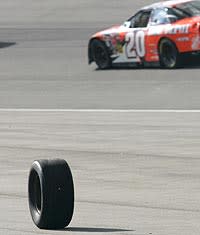Inaugural Chase was best yet

Going into the final race of 2004, Jeff Gordon, Jimmie Johnson and Kurt Busch were separated by 21 points.
(AP)
HOMESTEAD, Fla. – After inhaling smoke from Jimmie Johnson's three-, going on four-year burnout, the mind might be too hazy to remember if NASCAR's Chase for the Championship ever produced a thriller.
It did, back in 2004.
That year, as the schedule wound its way down to south Florida for the season finale at Homestead-Miami Speedway, five drivers still had a shot to win what was then known as the Nextel Cup. The suspense was palpable. No one knew what to expect, who would win and there was a real fear that a non-Chase driver would wreck one of the contenders, flipping the script on what was shaping up to be the Hollywood ending Brian France had dreamed of when he unveiled the controversial new points system 10 months earlier.
All the characters were in place, each with their own unique storyline. There was Johnson, the newcomer trying to win the title for his grieving car owner, who only a few weeks earlier had buried his son, brother and eight other family members and friends who perished in a plane crash. Jeff Gordon, the aging boy wonder, was going for that elusive fifth title. Dale Earnhardt Jr., the son of a legend, was trying to live up to his family name. Mark Martin was the 45-year-old veteran who'd finished second four times but had never won, and Kurt Busch was the bad boy who'd gotten his butt kicked by a fellow competitor a year earlier.
Going into the Ford 400, Busch held a scant 18-point lead over Johnson, 21 over Gordon. Earnhardt and Martin were further back at 72 and 82 points, respectively. Still, all five were well south of the 108-point lead Johnson holds over Martin heading into the 2009 finale.
"We are prepared to win on Sunday," Busch said two days before the 2004 finale. "We're prepared to lose as well."
When they lined up to take the green flag that Sunday, Busch started from the pole. Gordon sat two spots behind him. Johnson was 39th.
What happened over the next three hours and 50 minutes proved to be an ending even Hollywood would have rejected for being too unbelievable.
"We started [first], but Greg Biffle was the strongest guy that day," Busch recalled. "We led a lap at the beginning and for the rest of the day. Greg Biffle was so strong, a teammate of mine, (and he) didn't allow the 24 (Gordon) or 48 (Johnson) to lead laps during the day."
Biffle did take off, but that didn't matter much. What did was where Johnson and Gordon would finish, and if Busch could stay close enough to them to maintain even a marginal lead.
Before the race, Johnson's crew chief, Chad Knaus, had already started playing mind games. By virtue of winning the pole, Busch earned his choice of pit stalls. His crew chose stall No. 1, right at the end of pit road. Gordon picked a stall two spots behind him. With the fourth-to-last pick, Knaus' options were slim, but he figured keeping his closest competitors within eyesight was vital, so he opted for stall No. 2, right behind Busch and directly in front of Gordon.
"I took [the stall] right in the middle of them just to try to add fuel to the fire and try to get everything going," Knaus recalled earlier this week. "At that point, it was every man for himself."
Starting 39th, Johnson had a ton of ground to make up. In the early going of the race, several accidents broke out right in front of him, prompting the normally staid driver to scream over his radio to Knaus, "Get me the hell out of here!"
Then, on Lap 49, things got really interesting. Sensing he had a tire going down, Busch, who was running second at the time, steered his car onto the pit access road that curves around Turns 3 and 4. He was certain to lose at least one lap, maybe two. His lead was gone and probably his shot at winning the title.

Had Kurt Busch's tire not rolled onto the track, the caution would not have come out, he would have fallen a lap down and might not have won the title.
(Getty)
But barely an instant before Busch veered onto pit road and inside its retaining wall, his left-front wheel came completely off, veering directly to the right. As Busch continued down pit road on three tires, the fourth rolled straight onto the track, bringing out a yellow flag for debris.
"If the wheel would have fallen off just a split second later, he'd have hit the end of pit wall," said Knaus, the frustration still evident five years later. "If the wheel would have fallen off just a split-second later, it would have went down pit road and the caution would have never come out."
Instead, Biffle slowed the field down on the backstretch as quickly as he could, hoping to give his teammate enough time to get four new tires and get back on the track without losing a single lap.
"You can't come to a complete stop, but you can certainly slow down," Biffle explained Friday. "So I slowed down to keep him on the lead lap."
Which is exactly what happened.
The trouble transferred the in-race points lead to Gordon, but Busch managed to stay on the lead lap. Meanwhile, Johnson was still fighting his way through the field.
One hundred laps in, Johnson had worked his way to the front. All three contenders pitted on Lap 114. Busch's stop was painfully slow. A miscommunication led to some confusion, with Busch not knowing if they were taking two tires or four. As he left pit road, now in 23rd, he said over his radio, "All right, boys, it's like we took a provisional. We are starting at the back and we have to work our way forwards just as we had a provisional and it's a shorter race. Hit your marks. Know what you're doing. Focus."
Gordon's championship hopes took a hit a few moments later when he steered his car back on pit road because he thought he had a tire going down. Staying on the track wasn't worth the risk, but it cost him. He dropped from fourth to 24th, one spot behind Busch.
Johnson, meanwhile, had moved up to third. Only six weeks earlier, he trailed Busch by 247 points. Now, he was the in-race points leader. He thought the title was his.
"To me, that year I really felt like was our year," he said last week. "The plane crash obviously took place. We won at Martinsville. We came back to Atlanta and won the following weekend. Guys were having trouble. We made up a lot of points.
"The Homestead race was going very good for us," he continued. "We were running well. Kurt has his issues. You know, it just felt like whatever that feeling is when it comes through your body and you feel it's going to happen, whatever it may be, I had all those sensations."
By that point, it was clear Earnhardt and Martin were going to come up short. It was now a three-way battle for the title, where every single move up and down the scoring chart would change who was in the lead.
With about 60 laps to go, all three came down pit road together for their final stops. Johnson, sandwiched between the two, took fuel only and was out first, followed closely by Gordon and then Busch.
The championship would be decided by a 60-lap, three-man drag race to the finish.
"We were all going to finish either in the 20s together or we were all going to work our way back from the pack and finish in the top five together," Busch explained. "For every car that they passed, I had to pass. It was the most excruciating final 60 laps that I've ever raced in my life."
Johnson led the way, slicing and dicing his way in and around traffic, doing everything he could to shake Gordon and Busch. But every car he passed, they passed.
Up front, Ryan Newman had wrestled his way to the lead and was on cruise control to the finish when with only two laps to go, a tire blew. Newman slammed into the wall, bringing out a caution.
Earlier in the season, bowing to complaints from fans who had paid good money to see a good finish, not one run under the shadow of a yellow flag, NASCAR implemented a "green-white-checker" finish – a two-lap sprint to the checkered flag.
Biffle held the lead, while Gordon was fourth, Johnson fifth and Busch sixth. To win the title, Gordon or Johnson would have to put cars between themselves and Busch.
"I knew I needed three or four cars between me and Kurt," Johnson recalled. "I look in the mirror, he's two cars back. I'm like, 'Oh, man, he's coming back. He recovered from his trouble.' "
On the restart, Johnson got around Gordon, then around Tony Stewart. Now only Biffle stood in the way between Johnson and the championship. As long as Busch didn't make up any more ground, winning the race and earning the five bonus points for leading a lap would be just enough to clinch the title for Johnson.
But Biffle was too strong. He held off Johnson, who finished second. Gordon was third. Busch, in the fight of his life, came home fifth. Johnson had cut into the lead, but not enough. Busch held on by a mere eight points – the closest championship finish in NASCAR's 56-year history.
"I have the hardest time remembering how those 60 laps went," Busch said. "I just know that there was a final restart and I had guys pounding on my rear bumper trying to pass us. I was trying to make my car as wide as I could and hang on."
In the five years since, the season finale has not approached the same level of intensity as it did in 2004. Tony Stewart in 2005 and Johnson the last four years arrived in south Florida with leads big enough that the only real threats to their title chances were an accident or a mechanical failure.
Though the 2004 Chase didn't set a precedent, it did introduce a future dynasty in the making.
"I think at that point we definitely established ourselves as a team capable of battling for the championship seriously and people really started to take notice of us," Knaus said. "So I think that was a step out season for the 48."
